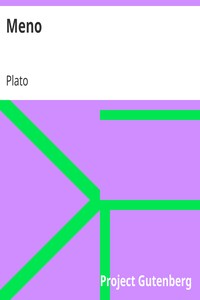Meno by Plato
"Meno" by Plato is a philosophical dialogue written in the late 5th century BC. The work primarily engages with the question of whether virtue can be taught and seeks to define what virtue itself is. At the center of the dialogue are Meno, a young Thessalian aristocrat, and Socrates, the famed philosopher, as they explore various propositions regarding the nature of virtue and knowledge. The opening of "Meno" begins with Meno questioning
Socrates about the teachability of virtue, proposing various definitions that Socrates deftly critiques. As they discuss the concept of virtue, Meno suggests that there are many kinds of virtue corresponding to different roles (for men, women, children, etc.), but Socrates challenges him to find a unifying definition. This leads to a deeper inquiry into knowledge itself, with Socrates proposing that learning is a form of recollection due to the immortality of the soul. The dialogue illustrates a process of dialectical inquiry, revealing both characters' evolving understanding of virtue, knowledge, and the nature of teaching. (This is an automatically generated summary.)
Read or download for free
| How to read | Url | Size | |||
|---|---|---|---|---|---|
| Read now! | https://www.gutenberg.org/ebooks/1643.html.images | 169 kB | |||
| EPUB3 (E-readers incl. Send-to-Kindle) | https://www.gutenberg.org/ebooks/1643.epub3.images | 105 kB | |||
| EPUB (older E-readers) | https://www.gutenberg.org/ebooks/1643.epub.images | 107 kB | |||
| Kindle | https://www.gutenberg.org/ebooks/1643.kf8.images | 188 kB | |||
| older Kindles | https://www.gutenberg.org/ebooks/1643.kindle.images | 177 kB | |||
| Plain Text UTF-8 | https://www.gutenberg.org/ebooks/1643.txt.utf-8 | 142 kB | |||
| Download HTML (zip) | https://www.gutenberg.org/cache/epub/1643/pg1643-h.zip | 102 kB | |||
| There may be more files related to this item. | |||||
Similar Books
About this eBook
| Author | Plato, 428? BCE-348? BCE |
|---|---|
| Translator | Jowett, Benjamin, 1817-1893 |
| Title | Meno |
| Note | Wikipedia page about this book: https://en.wikipedia.org/wiki/Meno |
| Credits | Produced by Sue Asscher, and David Widger |
| Reading Level | Reading ease score: 75.4 (7th grade). Fairly easy to read. |
| Language | English |
| LoC Class | B: Philosophy, Psychology, Religion |
| LoC Class | PA: Language and Literatures: Classical Languages and Literature |
| Subject | Classical literature |
| Subject | Socrates, 470 BC-399 BC |
| Subject | Ethics -- Early works to 1800 |
| Subject | Virtue -- Early works to 1800 |
| Category | Text |
| EBook-No. | 1643 |
| Release Date | Feb 1, 1999 |
| Most Recently Updated | Jan 16, 2013 |
| Copyright Status | Public domain in the USA. |
| Downloads | 1317 downloads in the last 30 days. |
| Project Gutenberg eBooks are always free! | |

